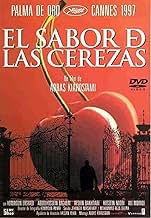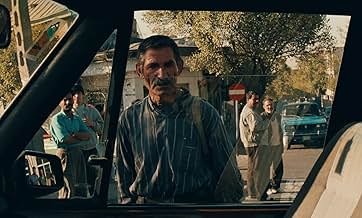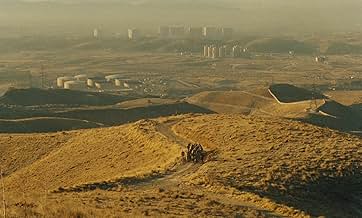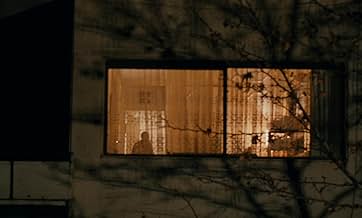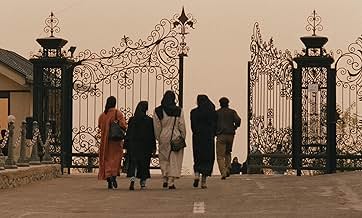An Iranian man drives his car in search of someone who will quietly bury him under a cherry tree after he commits suicide.An Iranian man drives his car in search of someone who will quietly bury him under a cherry tree after he commits suicide.An Iranian man drives his car in search of someone who will quietly bury him under a cherry tree after he commits suicide.
- Director
- Writer
- Stars
- Awards
- 3 wins & 5 nominations total
- Director
- Writer
- All cast & crew
- Production, box office & more at IMDbPro
Featured reviews
Suicide, in itself, is a ready and obvious turn-off for many viewers, probably. And coupled with the apparent treacle-like pace of the narrative and the repetitive scenes of a lone man, Badii (Homayoun Ershadi), driving in and around hills outside Tehran, this story gives a whole new dimension to the idea of going over the same ground, again and again, to prove a point. And all the while we, as viewer, are inside the auto for most of this movie, up close and very personal....
But to avoid seeing this movie would be a big mistake, in my opinion.
I say that simply because the idea of suicide has probably occurred to most people, including myself, at some time in their lives. Whether that idea was part of Kiarostami's motivation for making this movie, we will never know, of course. I dare say it occurred to him, though.
At the first frame, we're in Baddii's well-worn Range Rover as he drives, his face set, his gaze wandering here and there, searching for a likely assistant for his plan to kill himself. In sequence, he stops a variety of men - a seminarian, a young soldier, a security guard; each man and Badii converse about his need to have somebody help him to suicide, Badii describing what a helper must do. Each time, Baddi has no success until, with a blindingly quick jump-cut, an old man, Bagheri (Abdolrahman Bagheri) is in the car, a helper who finally agrees to abide by Badii's wishes.
So, after taking Bagheri to close where he lives, Badii drives off, content that he has secured a deal; rapidly, however, he drives back in a fluster, as doubts creep into his mind. Frantically, he walks around the area until he finds the old man Bagheri to seek further assurance he will indeed help Badii next morning. Somewhat annoyed, the old man again gives his solemn promise. And stalks off.
Slowly then, Badii returns to his home/apartment, makes his final preparations, makes a point of turning off all the lights as he leaves, locks the door, leaves his car, and then takes a taxi back to the cherry tree, he had previously selected, at which he will terminate his life during the night, and as thunderstorms - a much-overused trope perhaps - begin.
It is there, then, that I will leave you to find out why Bagheri decided to help, and about Badii's fate that night. And about an absolutely unexpected ending.
It's a bleak story, but one that is played out in too many ways by thousands every day, more or less in every country on the planet, probably. Perhaps then, Kiarostami is urging us to think upon that more often as we all traverse our own daily ups and downs - and especially in relation to those who are nearest. Once seen, this is not a movie to forget.
Recommended for all, except toddlers obviously. Give it eight out of ten.
I was afraid that if I ended the movie where Mr. Badie laid down on his grave the spectator would be left with a great deal of sadness. Even though I didn't think the scene was really that sad, I was afraid that it would come out as such. For that reason I decided to have the next episode where we have the camera running as Mr. Badie was walking around. I wanted to remind spectators that this was really a film and that they shouldn't think about this as a reality. They should not become involved emotionally. This is much like some of our grandmothers who told us stories, some with happy and some with sad endings. But they always at the end would have a Persian saying which went like this "but after all it is just a story! . . . The very last episode reminds me of the continuation of life, that life goes on, and here the audience is confronted with the reality they had hoped that Mr. Badie would be alive and there he is a part of nature and nature still continues and life goes on even without Mr. Badie. And if one could really think about being or not being present in life, or if one thinks about it in terms of the real implication of such presence, one might not in fact engage in committing suicide at all. The person committing suicide might think that s/he is taking revenge from the society, nature, life, powers to be, and so on. But s/he don't realize that after a suicide life still goes on and things stay the way they are. I could interpret this in a different way. If my audience is as creative as I imagine them to be, they can take this in a variety of interpretations and I can sit here and every time make a different interpretation of it, as every time one can creatively reinterpret the reality. "
"The Taste of Cherry" is a metaphor for the sweet taste of life only someone at the edge of death can truly appreciate, like a beautiful sunset, a colorful sunrise, the sight of children playing and smiling, a comforting thought, any sign of kindness... which the film is stingy of, deliberately, until its final act. Abbas Kiarostami doesn't paint the canvas of a happy nation because its focus is the sad face of a man named Mr. Badil, selfishly resigned to commit suicide and looking for someone to bury his corpse after he finds him dead in a pre-digged hole. Everything's planned except for that last formality.
To use a hackneyed expression, the destination here doesn't matter, only the car journey of a man trying to pick up a helper to fulfill his last wish. Over the course of this sad odyssey, he'll meet a young and shy soldier from Kurdistan, an Afghani seminarian and an aged taxidermist, the young man feels entrapped in a situation whose awkwardness go beyond the realm of ordinary problems he's used to live. The second embodies the religious side of the story and expectedly reminds Badil that suicide is taboo in religion and wouldn't make himself an accomplice, his tone is not preachy but rather amiable and friendly.
But Badil is a stubborn man, and for each argument finds a verbal counterattack, a job is a job, why would a poor man refuse the opportunity of a six-month wage for burying a corpse. Why would God punish someone whose unhappiness will only cause more harm to the beloved ones? Still, the tone changes and Badil gets more eloquent until he finds the wise old man who embodies our own vision: life is just too precious and valuable, he evokes what makes things worth to live, he tells a joke, he sings but finally agrees to do the job, hoping that Badil will do the right choice and choose not to kill himself.
Let's get back to Badil and more importantly, the car, which is inseparable from the story, as both a means to a morbid end and its paradoxical obstacle. The car is his life, it represents the only zone of comfort left in his supposedly meaningless life, through the windshield, he offers us a glimpse of a seldom seen Iran, not too religious, struck by employment, full of life and can only offer his Range Rover as a sign of his wealth, completely oblivious to the social realities of his own country. Badil doesn't even realize that his invitations sound like sexual pick-ups in a country where homosexuality is more taboo than suicide. He never finds the proper words to get to the point, maybe too focused on the road, to be able to empathize with his passengers' point of view. The car is his life, the road is his death.
But we're embarked as passengers in the car of life and from the regular external shots of the car driving through the deserted area, we see that the man is circling around the same road, and understand how truly lost he is. Badil the man in the car is hard to like and it's only after he meets the old man that he wises up a little, leaves the car and seems to have clear directions. Before, he joined a guardian up his little tower and enjoyed the sight while the guardian deemed it as dust and earth. For once, it's Badil who sees the half-full glass, all good things come from dust and earth, the guardian says everything gets back to dust. Outside the car, Badil can taste a few things, if not cherries, in the car, he doesn't even acknowledge the help of the workers who gave him a lift when one wheel fell near a ravine.
Kiarostami plunges us in the mind of someone who doesn't know where to go, it's not much a study on Badil but on the state of mind of suicidal persons. The film demands some patience and I'm not sure the ending rewards it but I guess it conveys the same sense of nothingness inherent to the lost soul. The ending is rather brave in the way it polarizes viewers but as someone who went through the same questioning, I know suicide is no kidding matter and I could feel the pain of Homayoun Ershadi, his desperation, his anger, his sadness, and after the man accepted to do the job, the realization that it was up to him now.
Whether he succeeded or not belongs to another movie and I'm not sure I would have loved a clear ending, in a way a satisfying study ends when the arc is fully closed, but the real focus isn't the driver, or the car, but the road. I know road movies can be wonderfully existential so this is a film that gets the perfect setting and road to contain these states of mind.
I used the word "existential dead end" for movies like "Magnolia" and "The Diving Bell and the Butterfly", the expression can apply for Badil's road. The whole irony is that as long as we can pick up passengers, no road will lead to a dead end.
Simple but not simplistic, complex but not complicated, straightforward in a circular way, the 1997 Golden Palm Winner is a special movie, not easy to watch but fascinating to contemplate.
Through the dialogue between different people from different classes, everyone has his own attitude about "life & death". I think we can't say which is right & which is wrong. Abbas only gives it to us & let us think for ourselves.
Every scene is simple & ordinary, but has a certain strange fascination. I have seen "Through The Olive Trees" before (also directed by Abbas). To be honest, I don't like it, although it's said to be a good film. But this one is different. "Go see it" is what I want to say.
worried that, as a filmmaker, Kiarostami would be as inaccessible
as Godard in the 80s. I was pleasantly surprised by A TASTE OF
CHERRY. It's a linear narrative, and the film's early ambiguity
concerning the driver's quest kept me guessing (I knew nothing
about this film going in, which was a real plus). The film's unusual
visual style, particularly the long unedited takes, works surprisingly
well for this type of story. I can understand why traditional
American filmgoers would be bored to tears by A TASTE OF
CHERRY, but for fans of independent and foreign film, it's a
worthwhile investment of your time. It probably works better with
an older audience that can identify with the world-weary
characters.
Did you know
- TriviaThe film was shot without a proper script, relying on improvisations.
- GoofsIn the opening scene, as Mr. Badhi is driving past laborers looking for work, the same middle-aged white haired man, wearing a checkered sweater vest, is seen twice.
- Quotes
Mr. Bagheri: If you look at the four seasons, each season brings fruit. In summer, there's fruit, in autumn, too. Winter brings different fruit and spring, too. No mother can fill her fridge with such a variety of fruit for her children. No mother can do as much for her children as God does for His creatures. You want to refuse all that? You want to give it all up? You want to give up the taste of cherries?
- ConnectionsFeatured in Especial Cannes: 50 Anos de Festival (1997)
- How long is Taste of Cherry?Powered by Alexa
Details
- Release date
- Countries of origin
- Official sites
- Language
- Also known as
- Taste of Cherry
- Filming locations
- Production companies
- See more company credits at IMDbPro
Box office
- Gross worldwide
- $11,207
Contribute to this page




